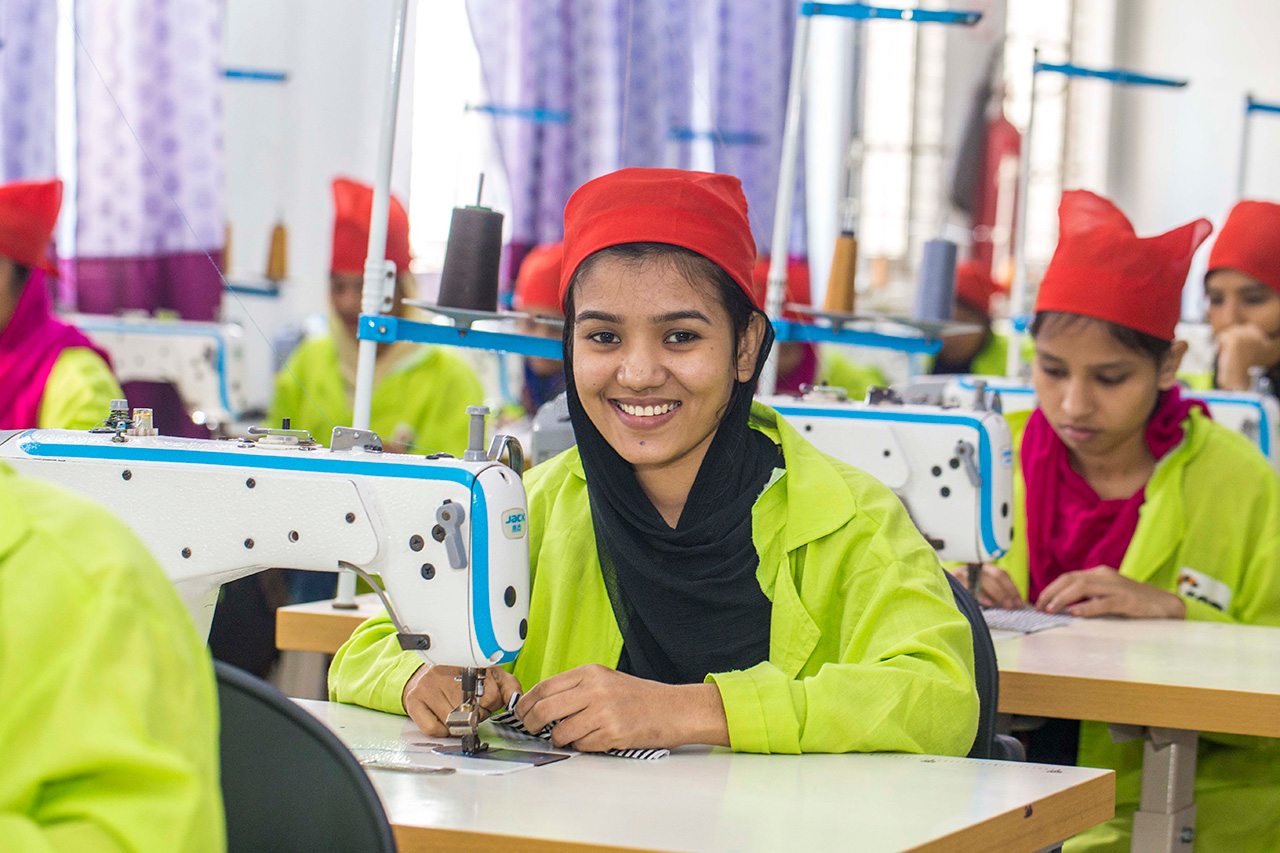Why we need to upskill women workers in Bangladesh’s apparel sector
Reading Time: 3 minutes
80% of the four million workers employed in Bangladesh’s garment factories in 2012 were women, mostly coming from marginalised backgrounds. This number has significantly declined over the last decade. Why are women leaving jobs at the factories, and what can be done about it?
The decreasing number of women workers can be attributed to a number of factors, but key among those are a lack of decent working conditions and a lack of adequate skill development. The industry has not ensured equal opportunities in supervisory roles, which has led to men holding the majority of supervisory positions.
95% of line supervisor jobs are held by men. Women are often not able to enter mid-management positions in the factories as employers often have a preconceived notion that women are incapable of handling these roles.
Read more: The garment industry needs more women leaders
Women can make a much more significant contribution to growth, leadership and innovation if we invest in upskilling women, promote safe, healthy and women-friendly working conditions and ensure strong representation of women at all management levels.
Read more: Building garment sector capacity at home in Bangladesh
In Bangladesh, just like many parts of the world, women are expected to play multiple roles in their day-to-day lives. This often makes employers assume that women cannot handle management responsibilities. A deep gender disparity exists inside the industry structure, with employers ultimately employing women often only in menial roles. Prejudices like “women cannot manage” hinder the efforts to climb the ladder. There are few initiatives to change the status quo.
Women can perform extremely well in mid-management. Studies show they have a more gender sensitive lens, and empathy towards their female team members in supervisory roles. This empathy will ensure a better working environment for all. Research conducted by BRAC found that women feel more comfortable working under female supervisors, as male supervisors can intimidate their female subordinates. Female counterparts were found to be more empathetic and supportive. Women have been the backbone of the apparel industry up until now, and research demonstrates that increasing the presence of women in the workforce can have significant benefits for economic growth, as seen in the Philippines and Vietnam.
Read more: Gearing up for more women leaders in the garment sector in Vietnam

Women can make a much more significant contribution in the apparel sector if we invest in upskilling them.
To support this industry gap, BRAC has been upskilling women for mid-management positions, where women can lead teams, or oversee quality inspection. BRAC is also working with factory managers to build a safe and supportive working environment for women to thrive in. BRAC recognises the importance of focusing on both hard skills and soft skills to make meaningful progress in reskilling, particularly with women, to equip them for the impending fourth industrial revolution – industry 4.0 – which will digitise many industrial practices. Industry 4.0 will bring in new technologies, like small and medium automation, that require more skilled workers. If women aren’t trained for that, they are likely to fall further behind.
Over 803,000 workers, 70% of whom are women, have been trained by BRAC since 2018. This has included both hard and soft skills, such as machinery operation and developing safety management systems. 32,000 workers have been equipped with the skills to address exploitation, abuse, harassment and gender-based violence, and this has been with both men and women – so that everyone has more understanding. Workers have reported that the training is helping them adapt better to changes in the industry, and build safer and more women-friendly work environments.

Women can enter mid-management positions and thrive if skilled adequately with both soft and hard skills.
Read more: An innovation fund for the RMG sector
Key stakeholders must take urgent actions to upskill women and create an enabling environment for them to thrive. Getting a critical mass of women to mid-management level positions is vital for the long-term sustainability of the apparel industry. Intervention at the policy level, incentives from the government and initiatives by factory owners, managers and industry organisations can bring important, much-needed solutions to the industry. A quota for women in supervisory roles would help accelerate the process of ensuring a gender balance.
Read more: Securing women’s place in Sri Lanka’s apparel industry
No country can elevate to middle income without women. The apparel industry, being the largest employer of women, must invest in unlocking the potential of women to support the Government of Bangladesh in achieving middle income status.
SK Jenefa Jabbar is the director of BRAC Social Compliance and Safeguarding (gender-based violence & workplace harassment) and leads BRAC’s overall readymade garment industry portfolio.
BRAC has been working with the apparel industry in capacity building training that ensures the workforce in an organisation are resourceful and skilled for the future. With a pool of experienced trainers and facilitators, BRAC is spearheading a new approach to a contemporary and effective training curriculum with a focus on soft skills building, leadership training, safeguarding (gender based violence and workplace harassment), safety awareness, safety management, anti-bribery and change management behaviour through its Social Compliance programme. To learn more about BRAC’s approach to supporting women in the apparel industry, visit BRAC’s page on strengthening Bangladesh’s readymade garment industry.





